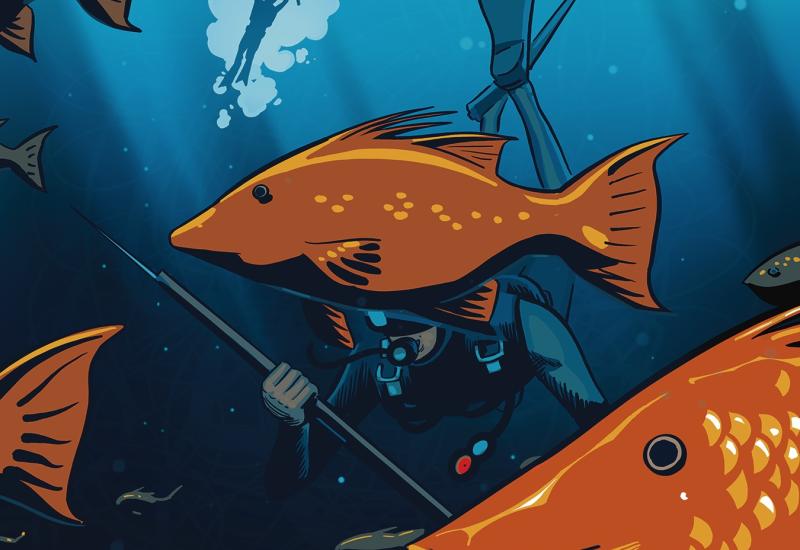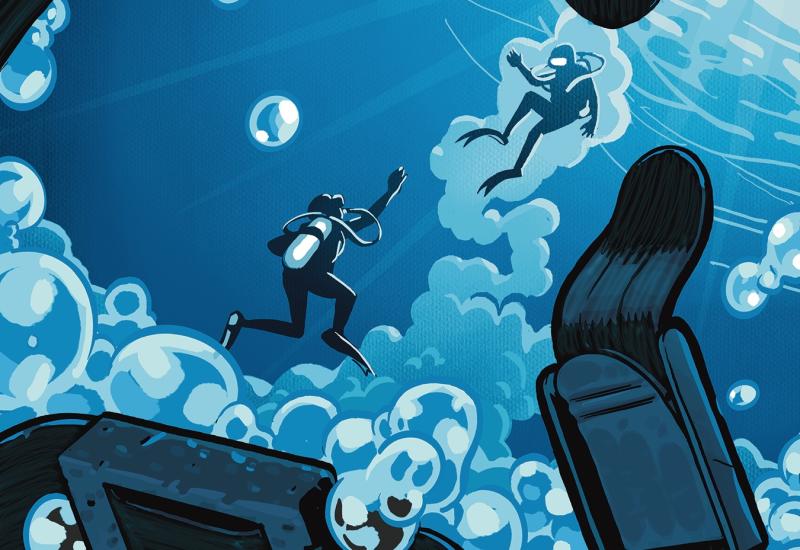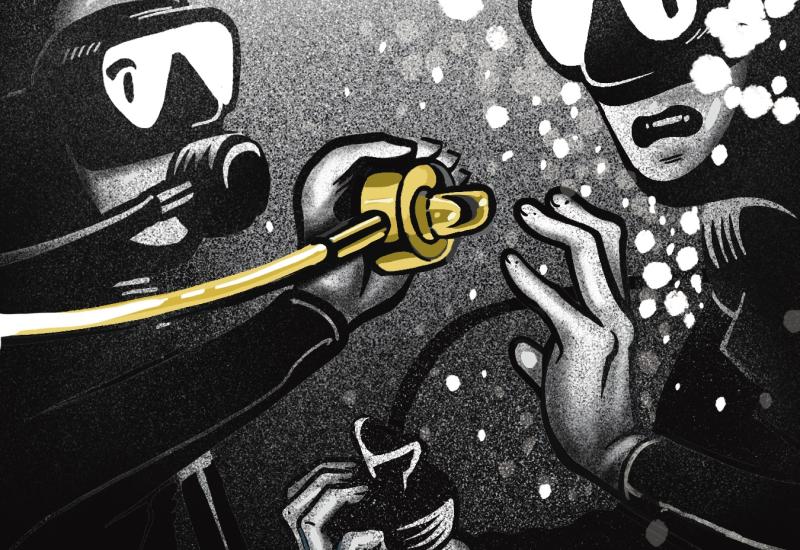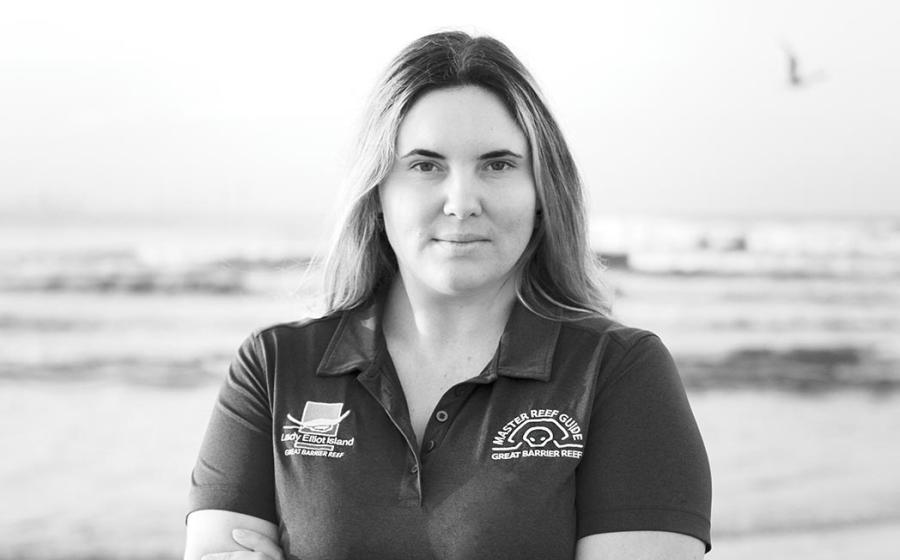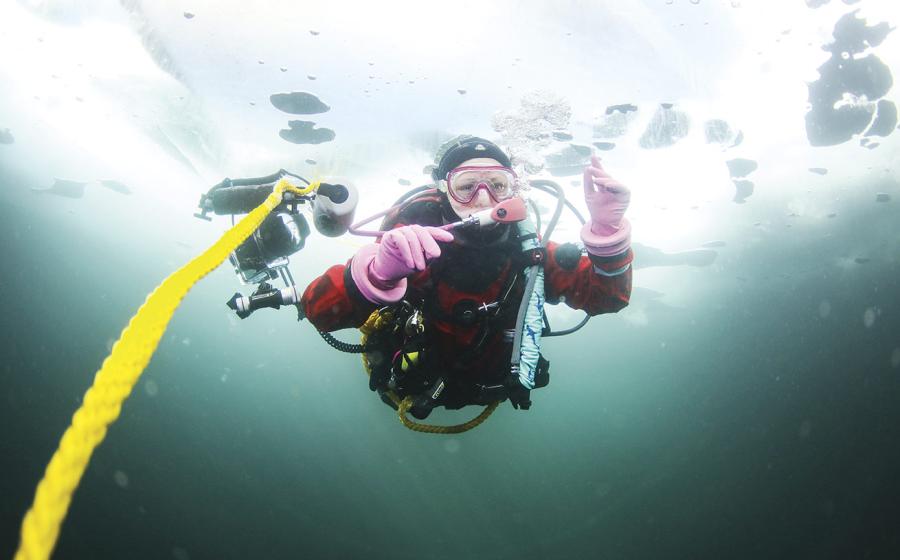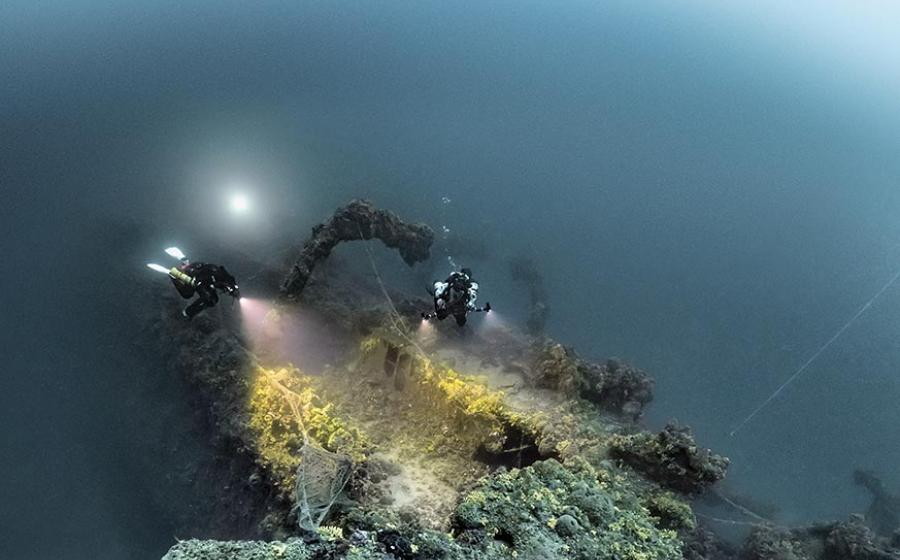Diver Hooked
March 2003
Although he had been diving only a few months, Mike was comfortable in the water, had logged more than 50 recreational dives and was preparing to begin divemaster training.
Mike met Jim, a towboat operator at the local marina. Jim wanted to expand his business to include underwater repairs. Jim needed a diver with reasonably good mechanical skills, and Mike fit the bill.
The Dive
XYZ Dive Charters operated a small six-pack boat, diving the California coast. After a successful day of diving, the vessel was bound for dock when the captain ran through an unseen obstacle that ensnared his prop. A quick look by the mate revealed that very heavy monofilament line and spider wire from a fishing rig were wound tightly around the shaft, preventing the prop from operating. Fortunately, Jim and Mike were out on the towboat, having just completed a dive of their own. The charter captain hailed them and requested assistance. The captain readily agreed when Jim proposed that he send Mike down to clear the prop.
The Accident
Mike had less than 1,000 psi in his cylinder when he re-entered the water and began freeing the prop. The job seemed simple. Mike would slice monofilament line from the prop shaft, then use his bare hands to pull the line free. All went well until the last pull. As Mike tugged hard on a piece of line and wire, a large hook pierced his hand, emerging on the other side. Mike was now effectively tethered to the prop shaft by six inches of sturdy wire gaffed to his hand by the barbed fish hook. Once the initial pain subsided, Mike regained control of his breathing and noticed with some desperation that his pressure gauge showed only 400 psi remaining. He frantically cut at the wire with his dive knife to no avail. As his air began to dwindle, Mike began pounding on the bottom of the boat, attempting to signal for assistance. Unfortunately, no one noticed. As Mike's pressure gauge needle approached zero, he began trying to work the hook back out of his hand, but the pain was nearly unbearable.
Assisted Self-Rescue
When Mike's regulator became difficult to breathe from, he sucked one last deep breath, ripped the hook from his hand and frantically rushed to the surface, holding his breath all the way. Mike reached the surface in severe pain and immediately attempted to board the boat. Halfway up the ladder, he became dizzy, disoriented and fell back into the water. The charter vessel's mate jumped in and assisted Mike on board the boat, where it was noted that his speech was slurred and he was extremely disoriented as well as bleeding profusely from his left hand. Mike was transferred to the towboat and taken to the nearest boat dock where the local EMS began 100 percent oxygen, bandaged his hand, and transported him to the nearest hospital. Mike was diagnosed with an arterial gas embolism resulting from surfacing while holding his breath from a depth of about six feet. After hyperbaric treatment, his symptoms resolved, leaving him with only mild nerve damage in his left hand.
Analysis
Several factors led to this accident. The first was Mike's inexperience. A more experienced maintenance diver would have refused to enter the water with an inadequate gas supply, would have checked for hazards like fish hooks and carried tools capable of cutting through the wire leader.
Mike should have set a pre-determined bottom time, monitored by Jim, to ensure he surfaced with adequate gas reserves. The plan should have included some method of communicating with the surface. Finally, Mike forgot the first rule of diving — never hold your breath. Always exhale forcefully all the way to the surface when making an emergency ascent.
Lessons for Life
-
Have a plan for every dive.
-
Proper training and experience are vital to any dive plan, regardless of its seeming simplicity.
-
Divers performing hull maintenance, diving in common fishing areas or on shipwrecks should always carry a pair shears for cutting through items that a knife cannot handle.
-
Always exhale forcefully when making an emergency ascent — even from shallow depths.
March 2003
Although he had been diving only a few months, Mike was comfortable in the water, had logged more than 50 recreational dives and was preparing to begin divemaster training.
Mike met Jim, a towboat operator at the local marina. Jim wanted to expand his business to include underwater repairs. Jim needed a diver with reasonably good mechanical skills, and Mike fit the bill.
The Dive
XYZ Dive Charters operated a small six-pack boat, diving the California coast. After a successful day of diving, the vessel was bound for dock when the captain ran through an unseen obstacle that ensnared his prop. A quick look by the mate revealed that very heavy monofilament line and spider wire from a fishing rig were wound tightly around the shaft, preventing the prop from operating. Fortunately, Jim and Mike were out on the towboat, having just completed a dive of their own. The charter captain hailed them and requested assistance. The captain readily agreed when Jim proposed that he send Mike down to clear the prop.
The Accident
Mike had less than 1,000 psi in his cylinder when he re-entered the water and began freeing the prop. The job seemed simple. Mike would slice monofilament line from the prop shaft, then use his bare hands to pull the line free. All went well until the last pull. As Mike tugged hard on a piece of line and wire, a large hook pierced his hand, emerging on the other side. Mike was now effectively tethered to the prop shaft by six inches of sturdy wire gaffed to his hand by the barbed fish hook. Once the initial pain subsided, Mike regained control of his breathing and noticed with some desperation that his pressure gauge showed only 400 psi remaining. He frantically cut at the wire with his dive knife to no avail. As his air began to dwindle, Mike began pounding on the bottom of the boat, attempting to signal for assistance. Unfortunately, no one noticed. As Mike's pressure gauge needle approached zero, he began trying to work the hook back out of his hand, but the pain was nearly unbearable.
Assisted Self-Rescue
When Mike's regulator became difficult to breathe from, he sucked one last deep breath, ripped the hook from his hand and frantically rushed to the surface, holding his breath all the way. Mike reached the surface in severe pain and immediately attempted to board the boat. Halfway up the ladder, he became dizzy, disoriented and fell back into the water. The charter vessel's mate jumped in and assisted Mike on board the boat, where it was noted that his speech was slurred and he was extremely disoriented as well as bleeding profusely from his left hand. Mike was transferred to the towboat and taken to the nearest boat dock where the local EMS began 100 percent oxygen, bandaged his hand, and transported him to the nearest hospital. Mike was diagnosed with an arterial gas embolism resulting from surfacing while holding his breath from a depth of about six feet. After hyperbaric treatment, his symptoms resolved, leaving him with only mild nerve damage in his left hand.
Analysis
Several factors led to this accident. The first was Mike's inexperience. A more experienced maintenance diver would have refused to enter the water with an inadequate gas supply, would have checked for hazards like fish hooks and carried tools capable of cutting through the wire leader.
Mike should have set a pre-determined bottom time, monitored by Jim, to ensure he surfaced with adequate gas reserves. The plan should have included some method of communicating with the surface. Finally, Mike forgot the first rule of diving — never hold your breath. Always exhale forcefully all the way to the surface when making an emergency ascent.
Lessons for Life
Have a plan for every dive.
Proper training and experience are vital to any dive plan, regardless of its seeming simplicity.
Divers performing hull maintenance, diving in common fishing areas or on shipwrecks should always carry a pair shears for cutting through items that a knife cannot handle.
Always exhale forcefully when making an emergency ascent — even from shallow depths.


